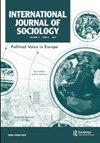Social Resources and Life Satisfaction: Country-Specific Effects?
IF 1.8
Q2 SOCIOLOGY
引用次数: 0
Abstract
Abstract Research has identified several factors that affect life satisfaction. The role of the state in this context, however, has been considered in only a few studies. Analyses of the relationships between national policies and life satisfaction have shown that the welfare state functions as a “resource giver” in creating inequalities in people’s quality of life. For this reason, we studied whether and how the effects of social resources on life satisfaction differ from country to country. Applying a multilevel analysis, we examined the resources embedded in networks and personal resources at one level as well as macro-information regarding the welfare state at another level. To this end, we used data from 27 countries drawn from the 2017 Social Networks Module of the International Social Survey Program and the United Nations Human Development Index. The results show that 7.4% of overall variance is at the country level. This can be partly explained by perceived inequality in a country, which we constructed for each country based on individual respondent data. Furthermore, in random-slopes analyses, we find evidence for country-specific effects of one of our central variables, goal attainment.社会资源与生活满意度:国家效应?
研究已经确定了影响生活满意度的几个因素。然而,只有少数研究考虑到了国家在这方面的作用。对国家政策与生活满意度之间关系的分析表明,福利国家在创造人们生活质量的不平等方面发挥了“资源给予者”的作用。因此,我们研究了社会资源对生活满意度的影响是否以及如何因国而异。运用多层次分析,我们在一个层面上考察了嵌入在网络和个人资源中的资源,在另一个层面上考察了有关福利国家的宏观信息。为此,我们使用了来自27个国家的数据,这些数据来自国际社会调查计划的2017年社会网络模块和联合国人类发展指数。结果表明,7.4%的总方差发生在国家层面。这可以部分解释为一个国家的感知不平等,我们根据个人受访者数据为每个国家构建了这种不平等。此外,在随机斜率分析中,我们发现了我们的中心变量之一目标实现的国家特定影响的证据。
本文章由计算机程序翻译,如有差异,请以英文原文为准。
求助全文
约1分钟内获得全文
求助全文

 求助内容:
求助内容: 应助结果提醒方式:
应助结果提醒方式:


